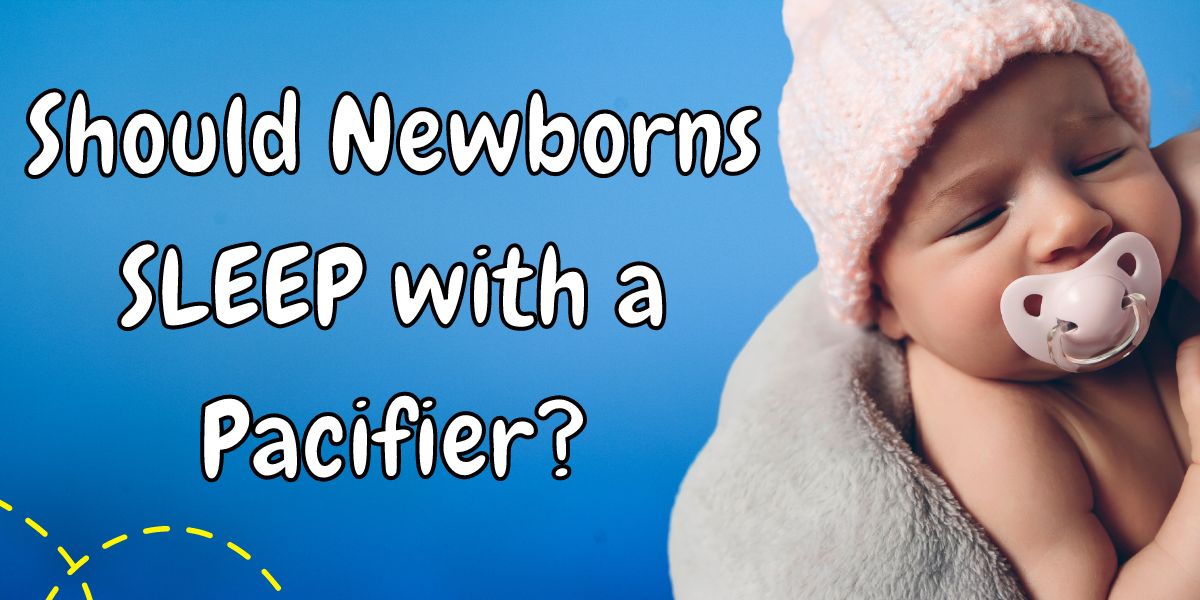It’s a question many new parents ask: Should newborns sleep with pacifiers? While pacifiers can indeed be a godsend for some, helping soothe and settle babies into sleep, they are not without their controversies and concerns. In this article, we’ll dive into the pros and cons of using pacifiers at bedtime, supported by pediatric advice and current research, to help you decide what’s best for your baby.
Should Newborns Sleep with Pacifiers?
Benefits of Pacifiers for Sleep

Soothing Effect: Pacifiers can be highly effective in soothing fussy infants. The sucking reflex is naturally calming for babies and using a pacifier can help them settle down and fall asleep faster.
Reduced Risk of SIDS: Several studies suggest that using a pacifier during sleep can significantly reduce the risk of Sudden Infant Death Syndrome (SIDS). The pacifier may help keep the airway open, or it could prevent the baby from falling into too deep a sleep during the early months when SIDS risk is highest.
Potential Drawbacks

Impact on Breastfeeding: Introducing a pacifier too early can lead to nipple confusion and interfere with the establishment of a good breastfeeding routine. It’s recommended to wait until breastfeeding is well-established (usually around 3-4 weeks) before introducing a pacifier.
Dental Issues: Prolonged pacifier use, especially beyond the age of two, can lead to dental problems such as malocclusions or altered tooth alignment. It’s important to monitor how the baby uses a pacifier as they grow.
Dependency Concerns: Some babies may become dependent on the pacifier for sleep, which can pose challenges when it’s time to wean them off. Gradual weaning can help mitigate these issues.
When to Introduce a Pacifier
The optimal time to introduce a pacifier is after breastfeeding is established but within the first few months to take advantage of the SIDS protection. This timing helps avoid interference with natural feeding techniques while still providing comfort and safety benefits.
Tips for Safe Pacifier Use

Choosing the Right Type of Pacifier: Opt for one-piece, dishwasher-safe pacifiers made of silicone, which are easier to clean and less likely to break than latex pacifiers.
Cleaning and Maintenance: Regularly check pacifiers for damage and cleanliness. Wash pacifiers with soap and water and dry them thoroughly to prevent bacterial growth.
Phasing Out the Pacifier: Start reducing pacifier use after the first year and aim to stop by age two to avoid dental problems. Gradual reduction can be less stressful for the baby.
Alternatives to Pacifiers for Soothing

Other methods to soothe a baby include swaddling, which can mimic the snugness they felt in the womb; rocking gently; playing soft music or white noise, which provides calming sounds that are reminiscent of the mother’s heartbeat and fluid sounds in the womb.
Expert Opinions
Pediatric experts generally support the use of pacifiers for sleep in the first year of life due to the benefits of SIDS reduction. However, they also emphasize the importance of proper timing and moderation to prevent potential breastfeeding and dental issues.
Parental Insights and Experiences

Many parents find that using a pacifier sparingly, particularly just for sleep, strikes a good balance between providing comfort and preventing dependency. Sharing real-life experiences in forums and social media can offer new parents a variety of strategies based on different family experiences.
FAQs
At what age can my baby safely use a pacifier?
You can safely introduce a pacifier as early as a few weeks old once breastfeeding is well established. However, it’s best to consult with your pediatrician to personalize this timing based on your baby’s health and feeding habits.
How can I reduce my baby’s dependency on the pacifier?
Begin by offering the pacifier only at naptime and bedtime to limit its use. As your child grows, you can start removing it once they fall asleep and gradually decrease its use over time.
Are there specific types of pacifiers that are safer for newborns?
Yes, pacifiers designed specifically for newborns are smaller and shaped to fit a newborn’s mouth. Always choose pacifiers made from safe, non-toxic materials and ensure they are sturdy and have air holes for safety.
Conclusion:
Choosing whether to let your newborn sleep with a pacifier is a personal decision that requires weighing the benefits against potential risks. By being informed and considering your baby’s unique needs, you can make a choice that supports healthy sleep habits and overall development. Remember, what works for one family might not work for another, and it’s okay to try different strategies to find what best suits your baby.

